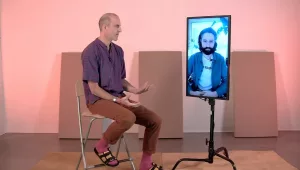Drawing on his experience as an artist who works through every new development of digital communication technologies, self-proclaimed Famous New Media Artist Jeremy Bailey shares his insights on the inspiration behind his contributions to the development of the Digital Economies Lab (DEL). Posed with questions like whether tech and digital spaces can resist their sinuous ties to capitalism – a notion that seems invaluable to artists – Bailey asks us if that is the point? Rather, he asks us to consider creativity and the pace of production in our evaluation and monetization of the arts. Art, profit, and governance are not mutually exclusive, or at least they don’t have to be. Countering a perceived dissonance between capital and art, Bailey challenges us to consider new media art as appropriating the means of production. How can artists be empowered to demand the true value of their work? What could artists learn from embracing startup culture? Are artists responsible for advancing culture? Do you think artists are endowed to care for the community and, if so, what infrastructure are you willing to establish to sustain that pastoral care? Join us as we tackle topics such as arts infrastructure, technology and capitalism, and the issue of reciprocal care between artists and society.
Explore more by Famous New Media Artist Jeremy Bailey:
Famous New Media Artist Jeremy Bailey
Check out how Jeremy Bailey is changing the Art world here:
Augmented Reality Art Tries to Overcome Reliance on Corporate Patrons
The Augmented Reality Portraiture of Famous New Media Artist Jeremy Bailey
Produced by the Artengine Stream Team:
Mikke Gordon aka Seiiizi https://twitter.com/s3iiizi
Ryan Stec
Kimberly Sunstrum https://www.kmbrlysnstrm.com/
Editorial Assistant
Erin Galt
Production Design Consultation
Leslie Marshall/MAVNetwork http://mavnetwork.com/
Post-Production Support: Chris Ikonomopoulos
DEL Theme Music by Mikki Gordon aka Seiiizi
Artengine’s Digital Economies Lab brought together a diverse group of artists, designers and other creatives to rethink the infrastructure of cultural production in the 21st century.
Funding for the Digital Economies Lab was received through the Canada Council for the Arts Digital Strategies Fund.
If artists have some responsibility, it is to advance culture.

From NFTs to governance structures, blockchain technology may be a glimpse into the future. At least that is what Jesse McKee and the team at 221A are exploring. In this conversation McKee shares a bit about the history of artist-run centres in Canada, the limitless potential for blockchain to change how society is ordered, and the rise of decentralized autonomous organizations (DAOs). Listen closely to discover the literary Easter eggs Jesse drops that are framing research at 221A.